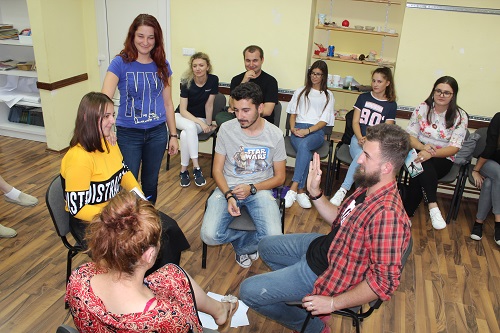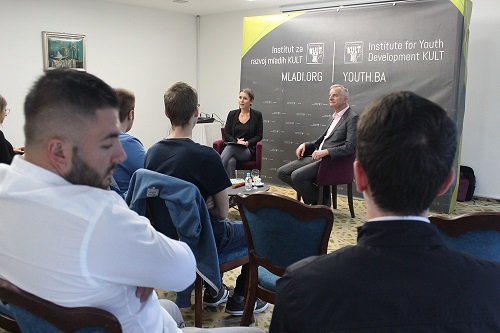When I first moved to Sarajevo I asked my roommate, a Swedish girl who had been living in Sarajevo for the past six months, how she answered the question “how do you find Bosnia compared to Sweden?” The first time I was asked this question I did not know how to answer. How would I be able to explain that it is so different in so many aspects without painting up Sweden as either this perfect utopia or a grey dystopia? Different does not always mean better, and as I myself is quite critical of many aspects of Swedish policy and society it would be easy to just focus on the things I find negative about Sweden. In the meantime, it would be highly insensitive to say that all problems in Sweden are the same as in Bosnia, not to mention ignorant. You can’t really put all the problems of one society on the same level as another with complete different context and history, which makes the comparison practically impossible. The advice I received from my roommate was that things simply are easier in Sweden.
It is not that things are per se easy in Sweden, and I am well aware that the privileges I have as a white, middleclass woman with educated parents have made my life easier than for many others in Sweden, but there are certain things that just “work” in Sweden that I as citizen can expect to happen. For myself and for other swedes it is usually when something does not work that we realise that we had something. We, as a society come from a privileged background with a welfare system that our grandparents built, many times at the expense of the most vulnerable in society. We had it easy because the Swedish economy was able to flourish when the rest of Europe had to rebuild after the second world war.
I could rail about how I can’t be sure of on being on time to work in Sarajevo because the tram is so unpredictable, but I’ve said the exact same thing about the commuter train in Stockholm. I could complain that the visa process is long, expensive, extremely bureaucratic and in the end fruitless, but then again, it’s almost impossible to get a visa to Sweden if you’re not a EU citizen. I could also throw my hands I air and scream “why?!” when the smog is so thick that my plain can’t land in Sarajevo, but it’s not that uncommon that plains can’t land in Sweden due to snow, ice or wind.
For me, living here has shown that Sweden and Bosnia are to some extent facing the same challenges. The difference is that while Sweden has the means fix our problems, we lack the will. Bosnians have the will and desire to improve, but it’s not easy to do when you lack the means.
Working for KULT
For four months I had the pleasure and the privilege to work for one of the best organisations I know: The Institute for Youth Development KULT. During these months I had the chance to get to know the organisation, to write reports on both entrepreneurship and youth work in Sweden, I had the honour of revising the gender policy and the joy of meeting and teaching youths English. I can easily say that this has been one of the most meaningful experiences in my life and I would not change it for anything in the world.
That said, there is always a challenge coming to a new country and starting a new job. It is never easy getting to know a new organisation, a new work culture or new colleagues. Especially when your backgrounds are so different as they were between KULT and I. I must admit that I struggled at first when I realised that the Swedish compulsory coffee breaks at ten and three did not exist at KULT. From a rational standpoint I could completely understand it, and I could even appreciate the freedom of planning my coffee breaks on my own, but I missed the structure and the sense of community that swedes create over a cup of joe. I also struggled with the early mornings, although I believe that this has more to do with being fresh from university and being able to sleep in during some of the week days than a cultural difference, and I will probably struggle equally when I start to work in Sweden.
However, what I learned from KULT and what I take with me as I leave outweigh my struggles beyond compare. To work at KULT is to work in one of the most amazing organisations I have had the pleasure of meeting. It is not easy to put into work the amount of gratitude and joy I feel towards the organisation and the wonderful people I have met. I loved getting to know my co-workers, their background, their work at the Institute and their hopes and dreams for the future, both their own and their country. In many situations I realised that I had to challenge my misconceptions and take a step back to learn. I had the feeling that no question was to stupid as long as it is asked in a respectful manner (something of a code to live by all over the world), and that my co-workers wanted me to understand. I never felt dismissed or ignored, but rather appreciated and seen.
Living in Sarajevo
The first time I went to Sarajevo I was 19 years old, fresh out of high school and struggling to recover from a depression. I had already decided that I would start university in the fall and the best way to celebrate being free of high school was to go back-packing through eastern Europe with my best friend at the time. Our forth stop was Sarajevo, and it would become my favourite stop of the trip. I fell in love with its people, its food(!) and its beauty. I knew I had to return as soon as possible.
Six years later when I saw an advertisement for an internship with the Olof Palme International Centre in Sarajevo I realised that this was the moment I had been waiting for. I applied, and by some stroke of luck I got the position at KULT. The trill of it was unimaginable and I could not wait to see my beloved Sarajevo again.
As I returned something struck me. The city had not changed, but I had. The historical sites were the same, the shopping places was the same (with few exceptions), and the food, people and general feeling of the city was the same. However, I was not the same as I was the first time. As I returned I had finished five years of university, several internships and dozens of journeys around the world, and I could fall in love with the same city all over again, but for new reasons. This time around I knew the complex history of the city and the region, I had talked to close friends who left Sarajevo during the 90:s and I knew the hopes for the future shared by BiH, the EU and Sweden. I can honestly say that I was more prepared to appreciate the full beautiful complexity that is Sarajevo during my second stay than my first. That is not to say that it is impossible to understand it during a few days without all the new knowledge I had, but I fear that as young people travel to Sarajevo, just as I did searching for excitement, freedom and a good time, they may miss some of the most important parts of Sarajevo. I have to admit that I might be a bit protective of my darling Sarajevo, and even though I want Sarajevo to reap all the financial benefits of tourism I hope that it won’t lose it heart and soul in the process – bought by some hipsters from Sweden just looking for a cool Instagram photo.
Meeting people my own age
One of the things I was most looking forward to with moving to Sarajevo was to get to know people my own age. I have a fascination for finding the experiences and pop-culture references we share, as well as the ones that are completely unknown. To learn what youth dream about, fear and dread, as well as are indifferent to provides a direction to where the country is going. From my time in BiH I learned that there are more things that we have in common that what separate us. Not only when it comes to the TV-shows we watch, the music we listen to or the places we want to see, but also the basic human experiences of love, friendship and ambition. The discussions I have had with some of my female friends in Sarajevo of balancing their dreams of a relationship, studies, a career and, one day, a family with the societal expectation on all of these are very similar to the conversations I have had in Sweden, Germany, Colombia and South Korea. Some elements of our personal lives are similar simply because we are around the same age, from similar financial background and women. These connections are fascinating and so important to remember.
Another experience I appreciate in my discussions with my peers are the political and structural. The struggle with the people in power not listening to youths are universal and the feeling of hopelessness when one’s voice is not heard is shared by youth in Sweden, BiH and all over the world. During most conversations I had with youths I could concur in their analysis and even though our historical background is different, the power structures that cause the problems for youths all over the world remains the same. To see this similarity can provide strength to youth workers all over to world, and especially to see that other youths share their struggles. I hope that I was able to convey this perspective to the youths I met, some of whom I now call my friends, and that they see how they gave this perspective to me.
Conclusion
It is hard to find a way to summarize or draw some conclusion of my time in Sarajevo. I learned so much about the city, the country, its people, and also about myself, that it is hard to put into words. The time I spent in Sarajevo took me on an amazing journey. Not only literal with living in a new country, and experiencing the surrounding countries, but also figuratively. Through the newfound knowledge of the country’s history, present and hope for the future I have travelled far and wide, gaining a profound understanding of the situation in BiH, the Balkans and its relation to the rest of the world. I have learned more about who I am in this situation and how I deal with unfamiliar circumstances. I have learned that a person can have more than one home, and I can now honestly say that Sarajevo feels like home to me. I am already thinking of how to find my way back to Sarajevo and I can’t wait to go back home again.















Leave a comment